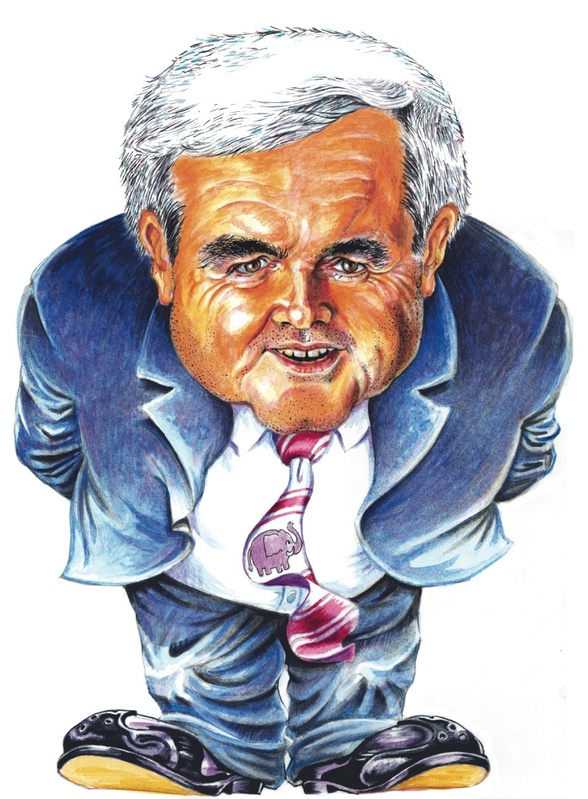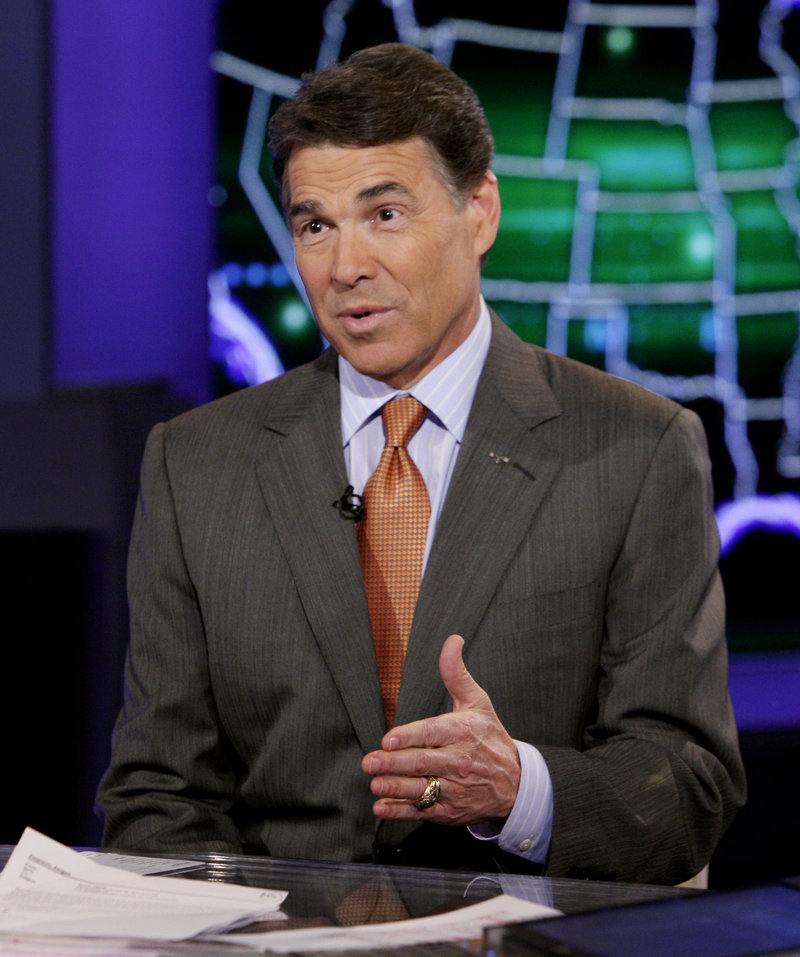Late this summer, Rick Perry was the presidential candidate of choice for tea party Republicans. Then the Texas governor had a few lackluster debate performances, and he defended himself by seeming to suggest that debating skills — and articulate speech in general — don’t matter in governing.
The man whom conservative activists turned to next, businessman Herman Cain, proudly declared that he wouldn’t bother to learn the name of the leader of Uzbekistan, and later struggled to recall President Obama’s actions on Libya. This past week, Cain said that the country needs “a leader, not a reader.”
Now tea party conservatives are embracing yet another candidate. Except this one will immodestly tell you about his doctorate in European history, his years of college teaching, his experience in policy matters foreign and domestic, and the number of books that bear his name.
“I have given probably 15,000 speeches. I have written 24 books,” former House Speaker Newt Gingrich said in a recent appearance on Fox News, discussing his and his wife’s publishing careers. “I am ahead of Callista in that sense — with ‘Sweet Land of Liberty,’ she’s only had one No. 1 best-seller. I’ve had 13 best-sellers.”
As the tea party movement surged in 2010, it was often dismissed by liberal critics as an anti-intellectual force led by figures such as Sarah Palin, who has dismissed the importance of answering reporters’ questions or learning the nuances of policy. At times, Cain and Perry seem to have embraced this caricature of the tea party.
But this is a serious misreading of the aims and goals of tea party activists. While it’s still not clear who will capture their vote, one thing is obvious: Playing dumb isn’t the way to win it. One person who understands that well happens to be Gingrich, the candidate now rising in the polls.
“If we nominate somebody utterly inarticulate, Obama gets a billion dollars, he spends two months smearing the Republican Party with negativity, and we have a candidate who can’t debate him — he might pull it off,” the former speaker told Politico.
It didn’t seem likely, as the Republican race got under way this year, that the party would consider someone “utterly inarticulate.” There were a few potential candidates who might have appealed to tea party voters while bringing deep policy knowledge to the contest, but figures such as former Florida Gov. Jeb Bush, Rep. Paul Ryan of Wisconsin and Indiana Gov. Mitch Daniels decided not to run.
The result is a Republican race featuring candidates who, because of their policy stances (former Massachusetts Gov. Mitt Romney, former Utah Gov. Jon Huntsman Jr.) or their personalities (former Minnesota Gov. and consummate nice guy Tim Pawlenty), have not delivered the type of firebrand conservatism that the tea party movement prefers.
Romney has rarely wooed the tea party directly. The former governor is trying to win over the rest of the GOP and assuming the tea party will come to him once he clinches the nomination.
For the other Republican hopefuls, particularly Rep. Michele Bachmann, R-Minn., Cain, Gingrich and Perry, any road to victory would go through the tea party.
Bachmann, who is not polling well now, heads the House Tea Party Caucus and has attended a number of the movement’s rallies. She has never embraced anti-intellectualism, and this past week she said that she hasn’t “had a gaffe or something that I’ve done that has caused me to fall in the polls.” She bristled, as did her supporters, when Fox News’ Chris Wallace asked her in June if she was a “flake.” But at times, despite her recent comments, she hasn’t been able to mask a basic knowledge problem (such as confusing some Revolutionary War history) that has caused Republicans to worry about her electability.
So far, for Cain and Perry, part of their appeal to the tea party has been an anti-intellectual one.
Though Cain joked, after his “9-9-9” tax plan was criticized, that he doesn’t have “just pepperoni between these ears,” he has embraced the gaps in his knowledge of foreign affairs as a badge of authenticity. In his recently released book, “This Is Herman Cain!” the former Godfather’s Pizza chief executive recalled an encounter after the first debate of the campaign, held May 5 in Greenville, S.C.
“People came up to me and said, ‘You know what I like most about what you said in that last debate? When you said you don’t have all the information — that you didn’t pretend you have a plan for Afghanistan.’ “
And after his interview with the Milwaukee Journal Sentinel this month, in which he seemed not quite clear on his or Obama’s approach to Libya, he flatly declared to the paper’s editors: “I’m not supposed to know anything about foreign policy. Just thought I’d throw that out. I want to talk to the commanders on the ground. Because you run for president, it is assumed you need to have the answer. No, you don’t! No, you don’t!”
Perry, earlier in his candidacy, made proud references to his lack of academic prowess. Some of the remarks sounded like his predecessor in the Texas governor’s mansion, George W. Bush, who often joked as president about not reading newspapers, despite his political experience and degrees from Yale and Harvard.
In a speech at Liberty University in September, Perry said, “I got my Webster’s out, and I just looked up the word ‘convocation’ to make sure I knew what I was walking into here.” He talked about how he had wanted to go to veterinary school, but the dean told him his grades were too low. “Four semesters of organic chemistry made a pilot out of me,” Perry frequently jokes on the trail.
At first, Republicans viewed Perry as a bit like Bush or Ronald Reagan — figures who, conservatives believe, may not have displayed as much raw intelligence as Obama but were unfairly cast by the news media and liberals as dumb.
And this approach could have worked if Perry’s debate performances hadn’t been so problematic. Tea party conservatives, like more establishment Republicans, see the debates as a test of a candidate’s ability to do the most important thing for both groups: beat Obama in the general election.
“They are looking for substance,” said Adam Brandon of the tea-party-affiliated FreedomWorks, describing the kind of voters his group works with. “You need to be able to explain and defend our values and have a good depth and understanding of where our values come from.”
But Perry didn’t seem to comprehend that; he demeaned the debates instead of reassuring his supporters that he could get better. His campaign hinted that he would skip some debates, but then it backtracked, perhaps realizing that backing out might confirm suspicions about his intellect.
Perry’s recent “oops” moment, when he forgot one of three federal agencies he would eliminate as president — making him appear unprepared and unserious about his own proposals — was hardly a strategic move. But his post-debate spin was all pander to that supposed lowbrow tea party voter.
“If Americans are looking for the slickest politician, the smoothest debater, I readily admit, I’m probably not their guy,” Perry said in an Associated Press interview. “The chattering class and the political pundits will try to guide this campaign. I’m going to be out talking to the people in South Carolina and Florida and New Hampshire and Iowa, those early primary states, about our vision for the country.”
Perry’s initial appeal within the tea party wasn’t about populism or anti-intellectualism, but rather his achievements as Texas governor. This suggested that he might be a candidate like Marco Rubio, the Florida Republican who won a Senate seat in 2010 as a tea party conservative but also a nerdy populist who enjoyed detailed discussions of issues.
“I think there’s this myth that this is an anti-intellectual movement, but it’s not against people who are smart and educated,” FreedomWorks’ Brandon said. “The anti-intellectualism is about people who think they know better; it’s intellectuals against free markets.”
Despite his early stumbles, from criticizing Paul Ryan’s budget plan to losing campaign staff en masse, Gingrich has stayed relevant in part because he has showed depth and knowledge in the debates, Republicans say.
Peter Wehner, who was a speechwriter for Bush, told The New York Times recently that many Republican candidates had demonstrated a “pride in ignorance and a lack of knowledge.” But he predicted, “At the end of the day, intellectual heft and command of policy and fluidity on the issues will carry the day.”
Romney’s campaign could be proving Wehner’s point.
Polls show that many tea party conservatives are still eager to find a different candidate. But prominent conservative activists who have criticized Romney’s record are gradually acknowledging that in an imperfect field, they would rather have a smart, mostly conservative candidate than a very conservative one who can’t answer basic questions.
Gingrich has made the same argument.
“One of the Republican weaknesses is that we rely too much on consultants and too much on talking points, and we don’t rely enough on actually knowing things,” he said in an interview with the Christian Broadcasting Network. “If you’re going to lead the country and change history, you better know a heck of a lot before you start, because there’s not much time for learning on the job.”
Copy the Story Link
Send questions/comments to the editors.




Success. Please wait for the page to reload. If the page does not reload within 5 seconds, please refresh the page.
Enter your email and password to access comments.
Hi, to comment on stories you must . This profile is in addition to your subscription and website login.
Already have a commenting profile? .
Invalid username/password.
Please check your email to confirm and complete your registration.
Only subscribers are eligible to post comments. Please subscribe or login first for digital access. Here’s why.
Use the form below to reset your password. When you've submitted your account email, we will send an email with a reset code.